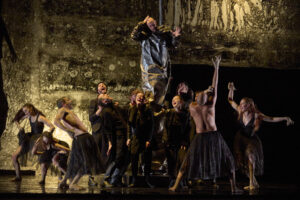
Opéra Royal de Versailles 2022-23 Review: Dido and Aeneas
Disjointed production and lackluster performance from world-class artists disappoints
By João Marcos CopertinoPhoto: Pablo Lorente
Opéra Royal de Versailles’ “Dido and Aeneas” has, on paper, great musicians, a good stage director, good dancers, and even William Christie. But that was not enough to prevent leaving the theater frustrated. The principal point of frustration came from how poorly conceived the production itself was. This failure is exclusive to good and well-intentioned artists—those from whom we expect much.
The stage was shared by three different art forms that barely communicated with one another: dance, orchestral music, and singing. There was a continuous battle between these three groups, and Henry Purcell’s music and Nahum Tate’s libretto were the main victims. The singers—rendered immobile, wrapped in impressive bronze togas that loomed as six-foot tall towers—had all their dramatic intentions performed by dancers on the floor while the orchestra was situated in the left corner of the stage. This was an interesting concept—for the first two minutes of the opera.
The costumes by Laurent Mercier, and the scenography by Evi Keller, were impactful, but beyond this did not contribute very much to the narrative. The concept proved to be vague. The dancers danced continuously—even when there was silence. The choreography, by stage director Blanca Li, sporadically complemented the music and action. It was not a matter of ugliness—the dancers and the dance seemed like they would work well in another context—but rather a total misreading of Purcell’s music. In certain moments the dance was vulgar and out of place, with the dancers making sexual noises that broke through Purcell’s melodies in the crassest way possible. Sex and sensuality have their place on the operatic stage. Yet a stage director must be attentive to the indications in the score to preserve something from a given sonic world: to create effects with, and not despite, Purcell’s music.
Respect the Sonic Universe
The lack of respect for the sonic universe of the opera was particularly evident in what was the most offensive and unprofessional manner possible. The stage was wet to facilitate the dancers’ sliding—which managed to give an illusion of freedom of movement. The problem was that this wetness was never masked to prevent oddly loud noises emanating from the dancers on the floor. The opera was repeatedly disturbed by a noise that sounded like nothing so much as two children’s party balloons being rubbed together or twisted to make novelty animals. Nothing could be more alien to the elegant lines of Purcell, and nothing could more closely approximate my personal definition of sonic hell.
Les Arts Florissants also decided to play the beautiful “Celestial Music Did the Gods Inspire” as the lost prologue to the opera. Although it is a wonderful piece, it is completely unsuitable to perform before “Dido and Aeneas’” strikingly melancholic prelude. The performers, moreover, made some elementary musical mistakes, which lowered the tone for the rest of the evening. The two male soloists in “Celestial Music,” Clément Debieuvre and Padraic Rowan, could not sing their notes through their vocal passage without cracking. This happened twice with one of the singers, making me almost wonder whether it was deliberate.
There were also some other equivocal choices in the opera’s performance. Renato Dolcini was double-cast in the parts of Aeneas and the Sorcerer. The singer showed a good voice and spoke with correct English in both parts. However, he was not particularly expressive in vocally differentiating between which character he was singing, an issue made all the more pronounced by the single, immobilizing costume he had to wear throughout. That lack of character expression was emphasized by Maud Gnidzaz and Virginie Thomas’ voices when singing the other witches. They made the most awful sound possible, singing everything in a caricature of a voice. Although I understand that it was an artistic choice, it only emphasized the stiffness of Dolcini and elicited no sympathy from the audience. It was as if the singers enjoyed their awkward singing despite its effect on the public.
The Positives
On a more positive note, Helen Charlston was a very interesting Dido. Her voice, slightly nasal, had enough darkness to bring out the Queen of Carthage’s sorrowfulness without losing agility and strength when singing the abrasive “away, away” in her farewell to Aeneas. In a production that chopped off so much of her means of expression—she could barely move her arms—Charlston found some means actually to convey emotion.
Quite likely, the most efficient singer of the night was Ana Vieira Leite as Belinda. Her voice preserved a good quality of pitch, great phrasing, and great interaction with the orchestra. When Leite sang “Diana’s self might to these woods resort,” it was evident how elegant she can sound. She is always attentive to the orchestra, leads the chorus, and preserves the text.
Les Arts Florissants usually plays well. However, in this “Dido and Aeneas,” their presence on the stage seemed calculated to make a statement—as if they were too important to be in the pit. That impression was not only visual but also musical. At times, it sounded as if they were asking for more attention than the drama itself. This was not to their benefit, as they had issues with synchronicity in many particular moments of the piece. This was not a problem exclusive to them. It seemed that each part of the operatic spectacle—orchestra, singers, dancers—was dilacerating every other part. It was a bad occasion, especially because none of them were mediocre musicians.


